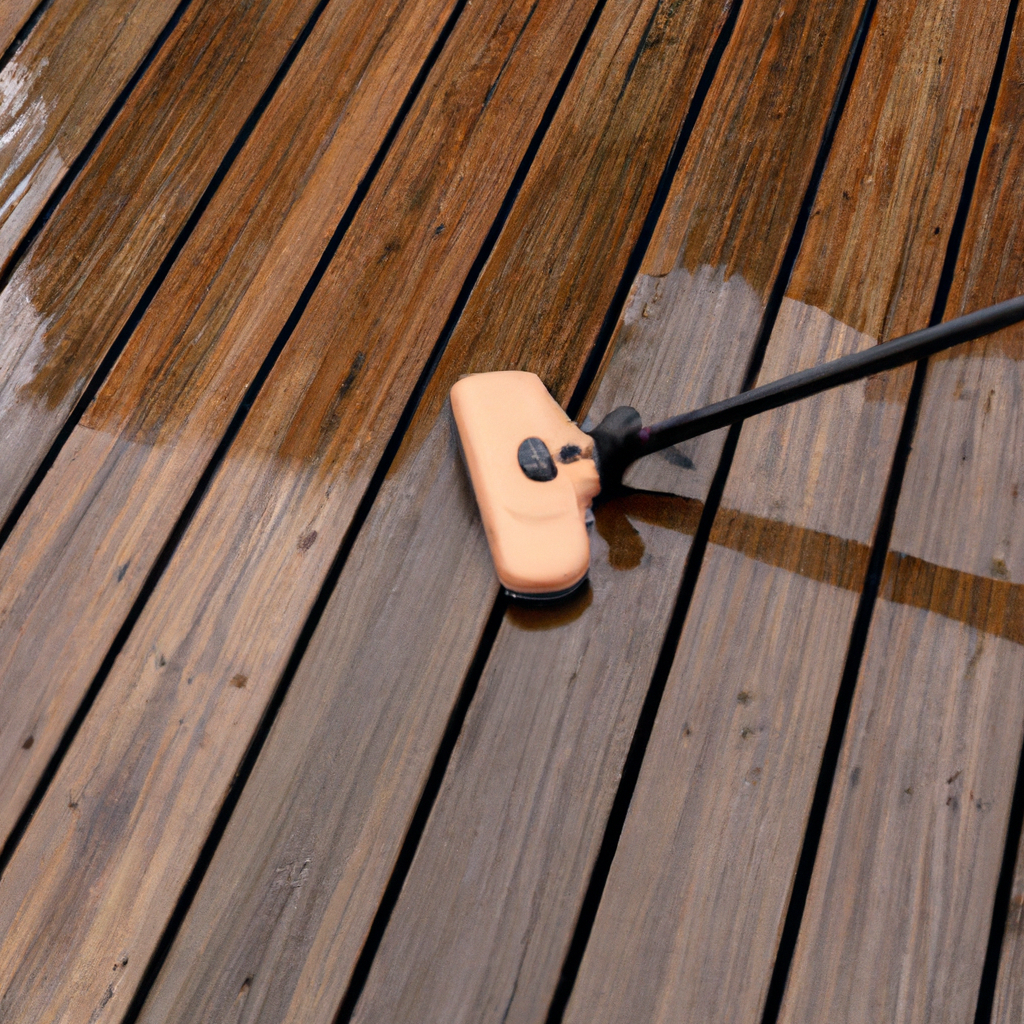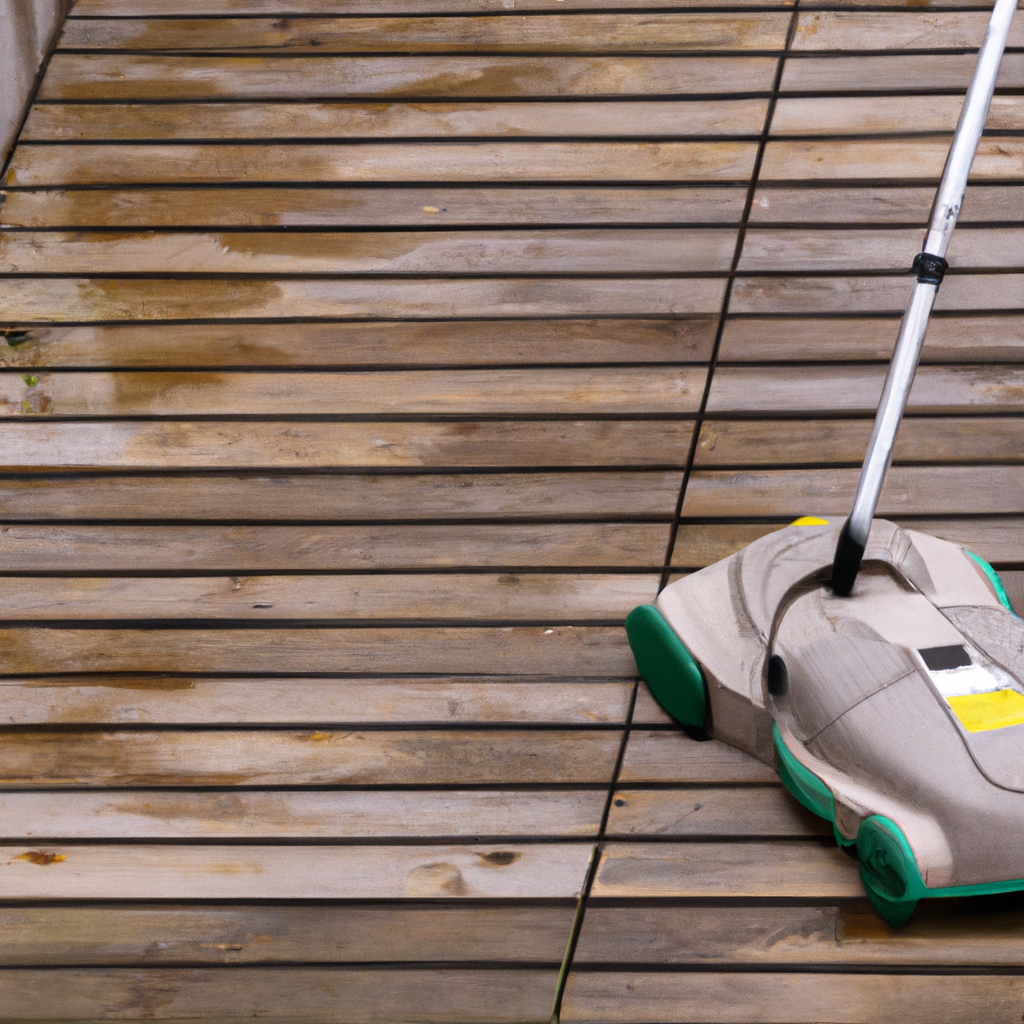
If you’ve been pondering whether or not it’s safe to use a pressure washer to tackle the grime on your deck, you’re not alone. Many homeowners have wondered if this powerful cleaning tool is suitable for their outdoor space. In this article, we’ll explore the pros and cons of using a pressure washer on your deck, and provide you with all the information you need to make an informed decision. So, before you power up that pressure washer, let’s examine the dos and don’ts of cleaning your deck with this high-pressure marvel.

Benefits of Pressure Washing
Pressure washing is an efficient and effective method for cleaning your deck and maintaining its overall appearance. By using high-pressure water, you can remove dirt, grime, stains, and even mold or mildew that may have built up over time. Pressure washing not only saves you time and effort compared to traditional cleaning methods, but it also helps to prolong the life of your deck by removing harmful substances that can cause deterioration. Additionally, pressure washing can also refresh the appearance of your deck, making it look like new again.
Considerations Before Using a Pressure Washer
Before you dive into pressure washing your deck, there are a few important factors to consider. These considerations will help you determine if pressure washing is suitable for your deck and ensure that you take the necessary precautions for a successful cleaning process.
Deck Material
Different deck materials may have different cleaning requirements. It is essential to know what type of material your deck is made of before using a pressure washer. For example, pressure washing is generally safe for wood and composite decks, but it may not be suitable for certain types of softer woods. If you are unsure about your deck material, it is best to consult with a professional or refer to the manufacturer’s guidelines.
Deck Condition
Assessing the condition of your deck is crucial before pressure washing. If your deck is in good condition, pressure washing should not pose any problems. However, if your deck is structurally compromised, has loose boards, or is showing signs of rot or decay, it is advisable to address those issues before proceeding with pressure washing. Pressure washing can exacerbate existing damage, so it is important to ensure your deck is in a stable condition before proceeding.
Safety Precautions
Using a pressure washer involves handling powerful equipment, so taking safety precautions is of utmost importance. Protective gear such as safety goggles, gloves, and closed-toe shoes should be worn to protect yourself from flying debris and cleaning solution splatter. Additionally, be mindful of electrical outlets and light fixtures on or near your deck. Cover them adequately before pressure washing to avoid any potential damage or electrical hazards.
Recommended Pressure Washer Settings for Deck Cleaning
To achieve optimal results while pressure washing your deck, it is essential to adjust the pressure, nozzle type, spray pattern, and distance according to the needs of your specific deck.
Pressure Level
When pressure washing a deck, it is generally recommended to use a pressure setting between 1200 and 1500 pounds per square inch (PSI). This pressure range strikes a balance between effectively removing dirt and stains without causing damage to the wood or composite material. Higher pressure settings can potentially splinter or etch the surface, while lower pressure may not effectively clean the deck.
Nozzle Type
The nozzle attachment on your pressure washer determines the spray pattern and intensity. For deck cleaning, a wide-angle or fan nozzle is typically recommended. This nozzle type provides a broader spray pattern, allowing for more even cleaning. Avoid using a narrow, concentrated nozzle as it can damage the deck’s surface.
Spray Pattern
The spray pattern refers to the shape and angle of the water stream emitted from the pressure washer. For deck cleaning, using a wider spray angle is preferable. A 25 to 40-degree spray angle helps to cover a larger surface area and evenly distribute the water and cleaning solution.
Distance
Maintaining the right distance between the pressure washer nozzle and the deck surface is essential to prevent damage. Generally, a distance of approximately 12 to 18 inches from the deck surface is recommended. Adjust the distance accordingly to ensure effective cleaning without causing any harm.
Preparing Your Deck for Pressure Washing
Before you start pressure washing your deck, a few preliminary steps can help prepare the area and ensure a smooth cleaning process.
Remove Furniture and Plants
To create an unobstructed workspace, remove all furniture, potted plants, and any other items from your deck. This will prevent potential damage to your belongings and allow you to thoroughly clean the entire deck surface.
Sweep the Deck
Before applying water, sweep the deck surface to remove loose dirt, leaves, and debris. This step will help prevent clogging of the pressure washer and ensure a more effective cleaning process.
Apply a Deck Cleaner Solution (optional)
If your deck has stubborn stains or mildew growth, you may consider applying a deck cleaner solution before pressure washing. Deck cleaner solutions can help break down and remove deep-seated dirt and stains. Follow the manufacturer’s instructions for the specific deck cleaner product you are using.
Cover Electrical Outlets and Light Fixtures
To protect electrical outlets and light fixtures from water damage, cover them securely before you begin pressure washing. This precaution will help prevent potential hazards and ensure the safety of your deck and surrounding areas.
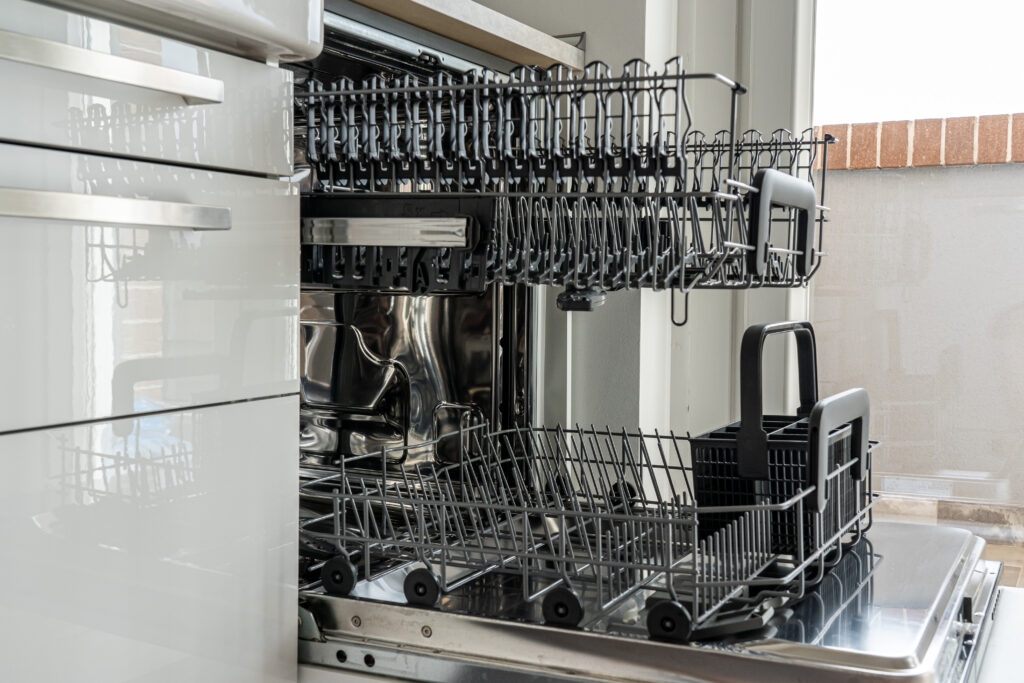
Steps to Pressure Wash Your Deck
Now that you’ve completed the necessary preparations, it’s time to dive into the actual pressure washing process. Follow these steps for effective and safe deck cleaning.
Test the Pressure Washer
Before starting, test the pressure washer on a small, inconspicuous area of your deck to ensure the pressure and spray settings are appropriate. This test spot will help you determine if any adjustments are necessary before cleaning the entire deck.
Wet the Deck
Using a garden hose, wet the deck surface thoroughly before applying the pressure washer. Wetting the deck beforehand helps to loosen dirt and prepares the surface for more effective cleaning.
Apply Detergent (optional)
If you opted to use a deck cleaner solution, follow the manufacturer’s instructions for applying it. Be sure to let the solution sit for the recommended amount of time to allow it to penetrate and break down any stubborn dirt or stains.
Scrub the Deck
Using the pressure washer in a sweeping motion, slowly work your way across the deck surface. Pay extra attention to areas with heavier staining or build-up. Move the nozzle consistently to prevent concentrating too much pressure in one spot, which could cause damage.
Rinse the Deck
Once you have thoroughly scrubbed the deck, rinse off the cleaning solution and any remaining dirt or debris. Start from the highest point of the deck and work your way down, ensuring that all areas are properly rinsed. Be sure to rinse away from any nearby structures or plants to avoid splattering or damaging them.
How to Avoid Damaging Your Deck
While pressure washing can be effective for deck cleaning, it is essential to take precautions to avoid causing any damage to your deck.
Avoid Using Excessive Pressure
Using excessive pressure can damage the deck’s surface. Start with a lower pressure setting and increase it gradually only if necessary. Test a small area first to ensure the pressure is not causing any harm.
Maintain Proper Distance
Keeping a consistent distance of 12 to 18 inches between the pressure washer nozzle and the deck surface is crucial. Maintaining this distance helps to prevent gouging or etching the wood and ensures even cleaning.
Keep the Spray Moving
Avoid leaving the pressure washer nozzle aimed at one spot for an extended period. Keeping the spray moving prevents excess pressure from damaging the deck and ensures even cleaning across the entire surface.
Avoid Concentrating on a Single Spot
As mentioned earlier, it is important not to concentrate the pressure washer spray on one spot for too long. This can lead to uneven cleaning and potential damage. Move the pressure washer nozzle steadily across the deck surface to achieve consistent results.
Be Careful around Deck Seams and Nails
Exercise caution when pressure washing around deck seams, nails, or any other raised elements on the deck surface. Directing high-pressure water at these areas can cause damage or loosen their hold on the deck structure.
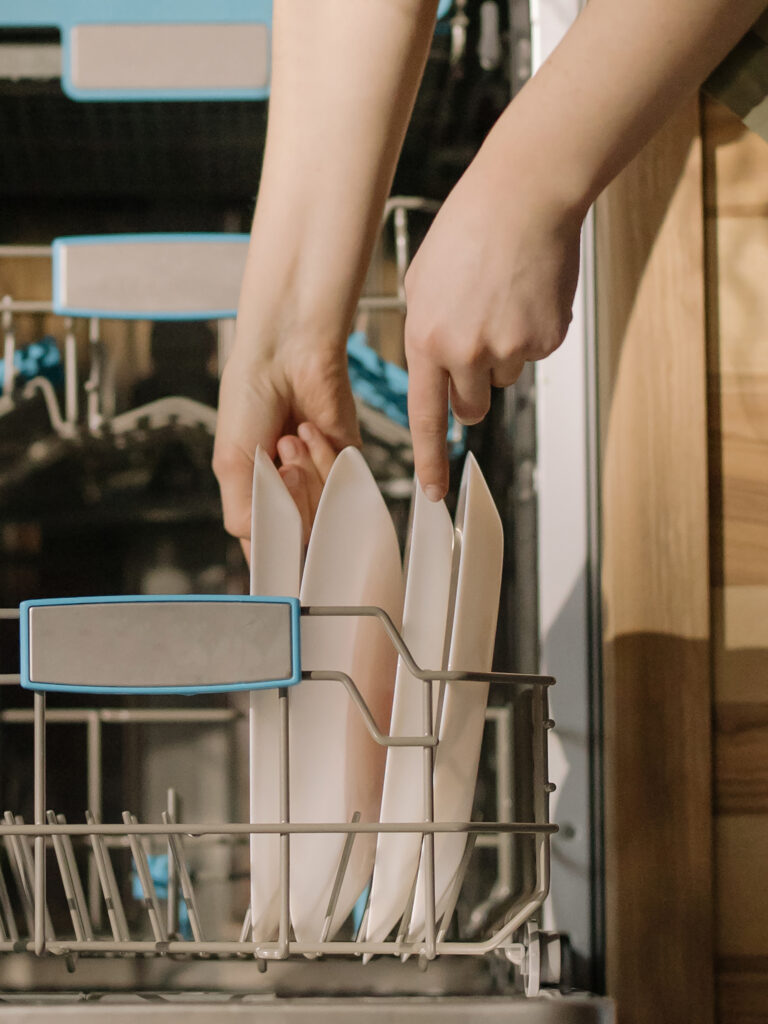
After Pressure Washing
After completing the pressure washing process, a few final steps will help ensure the longevity and visual appeal of your newly cleaned deck.
Allow the Deck to Dry
Allow your deck to dry completely before walking on it or replacing any furniture or plants. Depending on the weather conditions, this may take a few hours to a day. Drying time can be accelerated by using fans or opening nearby windows to promote airflow.
Apply a Sealant or Stain (optional)
Once the deck is thoroughly dry, you may choose to apply a sealant or stain for added protection and aesthetic enhancement. Sealants help to prevent moisture penetration and protect the wood from UV damage, while stains provide color and further safeguard against wear and tear. Follow the product instructions for proper application and drying times.
Replace Furniture and Plants
Once the sealant or stain is dry, you can safely return your furniture and plants to the deck. Ensure that the deck is completely dry and that the finish is fully cured before placing any objects back on its surface.
Alternative Methods for Deck Cleaning
While pressure washing is an efficient and popular method for deck cleaning, there are alternative methods that you may consider depending on your circumstances and preferences.
Hand Scrubbing
For smaller decks or areas that require more precise cleaning, hand scrubbing with a stiff brush and deck cleaner solution may be a suitable option. This method allows for greater control and attention to detail, although it may require more time and physical effort.
Deck Cleaning Solutions
In addition to pressure washing, deck cleaning solutions can be used to tackle specific stains, mold, or mildew issues. These solutions are designed to break down and remove stubborn dirt, leaving your deck looking fresh and revitalized. Always follow the manufacturer’s instructions for mixing and application.
Broom Cleaning
If your deck requires a more gentle cleaning approach, a broom and mild detergent can sometimes be effective. Use the broom to scrub the deck surface with a mixture of mild soap and water, paying extra attention to stained or dirty areas. Rinse off the soapy residue thoroughly and allow the deck to dry.
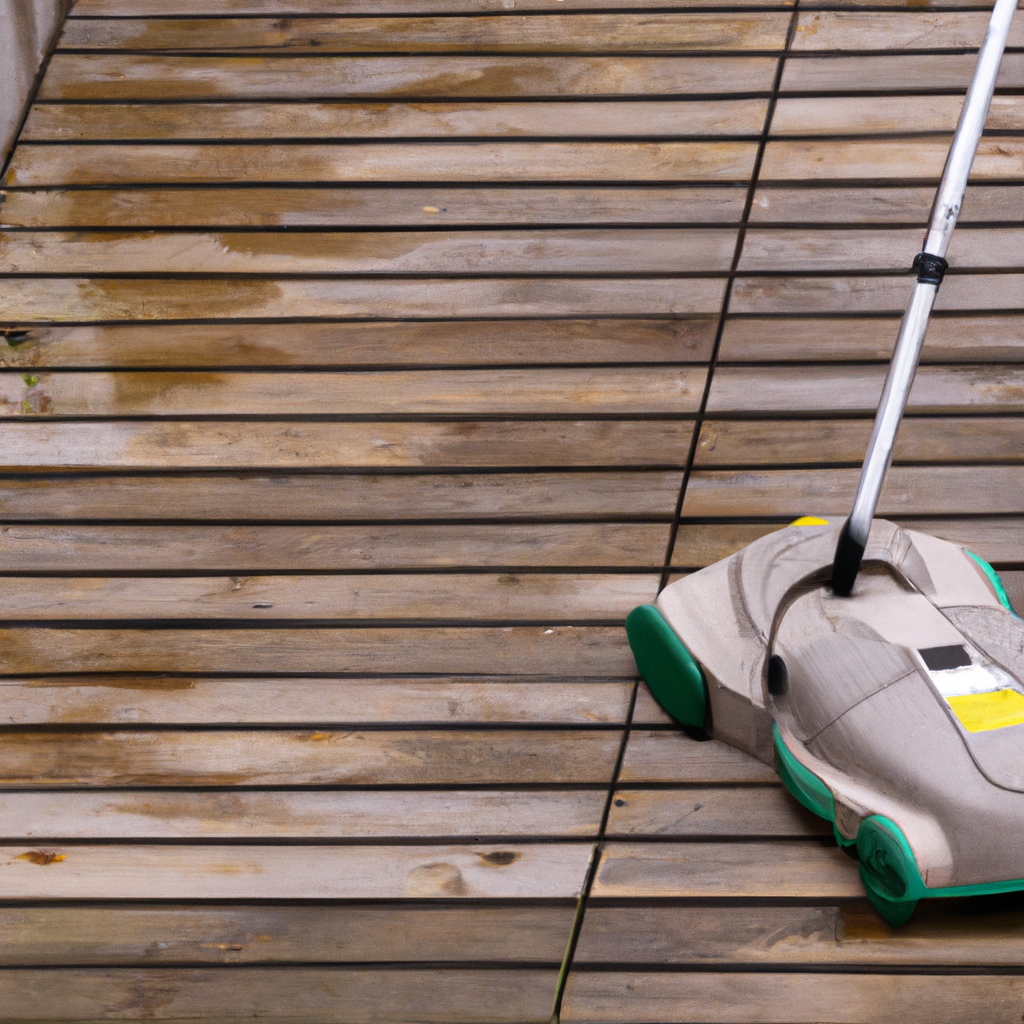
When to Hire a Professional
While pressure washing your deck is a manageable task for many homeowners, there are situations where hiring a professional may be more suitable.
Extensive Damage
If your deck has extensive damage, such as rot, decay, or structural issues, it is best to consult a professional. They will have the expertise and knowledge to assess and address these more significant issues before attempting any cleaning.
Limited Time or Resources
If you have limited time or lack access to proper pressure washing equipment, hiring a professional can save you time and effort. Professionals can efficiently complete the task, ensuring thorough cleaning and optimal results.
Lack of Experience or Confidence
If you are not familiar with pressure washing or lack confidence in your ability to perform the task safely and effectively, it is wise to hire a professional. They have the skills and experience necessary to handle the equipment and tackle any challenges that may arise.
Conclusion
Pressure washing is a fantastic option for cleaning your deck and restoring its appearance. By following the recommended settings, taking necessary precautions, and properly preparing and post-cleaning steps, you can achieve outstanding results. However, it is crucial to consider the specific needs of your deck and exercise caution throughout the process to avoid any potential damage. If you have any doubts or concerns, do not hesitate to consult with a professional who can guide you in maintaining your deck’s cleanliness and longevity.
